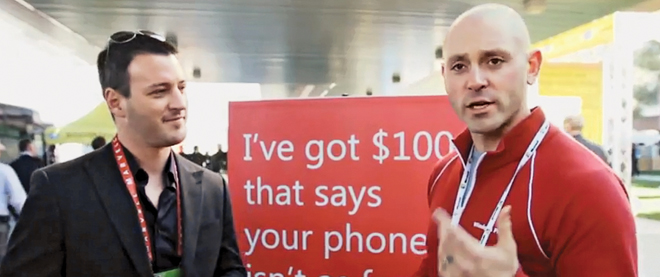Microsoft strikes back
Their latest ads attack competitors Apple and Google. But will the frontal assault pay off?
Microsoft ad
Share

After being pounded mercilessly for two years with Apple’s popular “Get a Mac” campaign, Microsoft is taking its own swipes at rivals with its “Smoked by Windows Phone” online ads. The spots challenge people to stack up their iPhones and Android devices in a speed test. A video on Microsoft’s Facebook site shows Windows Phone user “Ben” betting people $100 that his device will be faster when it comes to taking photos and posting them to Facebook, or pulling up directions to a nearby restaurant. Guess who wins?
Alan Middleton, a professor of marketing at York University’s Schulich School of Business, says Microsoft needs to breathe some life into its staid brand at a time when desktop computers (where Microsoft’s Windows operating system dominates) are gradually ceding ground to mobile devices running Apple’s iOS or Google’s Android. Case in point: thanks to the iPad, Apple is now considered the biggest maker of mobile computers, boasting a quarter of the market. “What’s happened in the last decade is that now you’ve got a whole bunch of new players out there tempting consumers with multiple ways to consume media and other information,” he says. However, he cautions that Microsoft needs to be careful because, despite its struggles in the mobile space, nobody is going to mistake the company for an underdog, considering that it generated US$70 billion in revenue last year. “The danger in 2012 is they will seem like a rich has-been,” he says.
That’s certainly the way the Redmond, Wash., company comes off in another sharp-tongued marketing effort. This time it’s a video that targets Google’s free productivity software, Google Apps, which competes with Microsoft Office. Google is portrayed as a smarmy salesman named “Googen Apperson,” who attempts to sell a company executive on Google’s services even though features may disappear unexpectedly, a reference to Google’s preference for beta-testing products on users. The video has so far been viewed about 728,000 times on YouTube, which, as commenters were quick to point out, is owned by Google. Ouch.